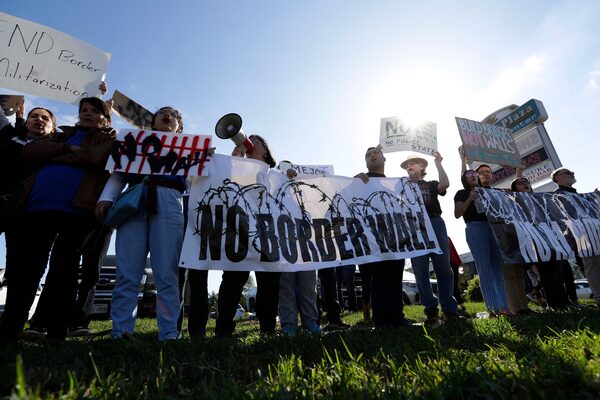
Groups opposed to a border wall being built along the Texas-Mexico border gather outside the McAllen International Airport as they wait for the arrival of U.S. President Donald Trump, in McAllen, Tex, on Jan. 10, 2019.Eric Gay/The Associated Press
It is the realization of all his supporters’ hopes, the sum of all his opponents’ fears: President Donald Trump is flirting with emergency powers to fulfill a dream.
By declaring a national emergency to use Pentagon funds to begin construction of a wall along the U.S. southern border, Mr. Trump would both redeem a campaign promise and widen the partisan and ideological divide in Washington. By extending his presidential powers and courting a constitutional crisis, he would take political warfare to a new, dangerous level.
On his way to the U.S.-Mexico border on Thursday, Mr. Trump told reporters that declaring a national emergency was still on the table.
The implications for the President and for his critics, not only in the Democratic Party but also among some Republicans and many traditional conservatives, could not be greater nor more grave. This action would come amid a political paralysis in Washington, with a government shutdown well into its third week, 800,000 federal workers dislocated, many normal functions of government suspended and the country’s credit and financial markets in the kind of upheaval that comes with uncertainty.
This new development also would come with historical irony. With few exceptions since the ascendancy of president William McKinley in 1897, Republicans since the end of the 19th century have been wary of government, fearing the excesses and abuses that come from a robust central authority, with some conservative activists hoping, in the words of 21st-century anti-tax advocate Grover Norquist, to “drag it into the bathroom and strangle it in the bathtub.”
Yet by citing and then assuming emergency powers that have never before been used to skirt congressional spending prerogatives, Mr. Trump faces the risk of being the new face of Big Government, an epithet Republicans have hurled with great success at Democratic presidents from Franklin Roosevelt for his New Deal to Lyndon Johnson for his Great Society and, in recent years, to Barack Obama for the health-care plan that bears his name.
Mr. Trump’s action may be intended to break the Washington deadlock, which has placed the border wall as the primary obstacle to the resumption of normal government operations, but its practical effect would be to deepen the political crisis. Asserting that he will build the border wall without congressional approval will not prompt Democrats, who know that polls show a majority of Americans oppose the barrier, to provide the votes to unlock government offices, provide credit reports for home loans and let funds flow to museums, national parks and landmarks so that they can return to normal hours.
Indeed, the practical effect of Mr. Trump’s initiative will be to stiffen Democratic opposition and provide fresh ammunition for liberal foes who believe he has the inclinations and temperament of a tyrant. It will also drive new wedges between the President, not steeped in politics and contemptuous of historical precedents, and establishment Republicans and right-leaning ideologues who revile his conduct and style and will inevitably see this decision as a power grab and a betrayal of conservative traditions and principles.
With resolution of the government shutdown now not only uncertain, but unlikely – the President said earlier this month he could see it lasting “years,” a notion that seemed fantastical only days ago – the only certainty would be uncertainty. There also would be multiple court arguments over a president’s prerogative to decide when an emergency exists and whether Mr. Trump has the constitutional authority to plow ahead with spending initiatives without congressional authorization or appropriation.
Ordinarily, such actions are separate, the purviews first of the budget committees on Capitol Hill and then of specific authorization subcommittees and committees, a process that customarily takes months and sometimes is not even resolved by the time the fiscal year ends each Sept. 30. Moreover, by specific constitutional provisions, spending measures must originate in the House of Representatives, which the Republicans controlled in the first two years of the Trump administration but that now is the lone, but highly significant, redoubt of Democratic power in the capital.
Other Republican presidents have tussled with Congress – perhaps none more than Richard Nixon, whose entanglement is etched in history.
As recently as this week, scores of Americans and foreign visitors went to the Richard Nixon Presidential Library and Museum in Yorba Linda, Calif., where events to mark what would have been the 37th President’s 106th birthday were planned.
The commemoration at Mr. Nixon’s graveside went on as scheduled. But the displays inside the museum were barricaded and the archivists who work with the former president’s copious yellow legal-pad notes and the sprawling files of documents were out of work, even barred from the premises.
With the 50th anniversary of the inauguration of Mr. Nixon only a week away, historians and commentators are examining the legacy of his presidency, ended when he resigned in the face of certain impeachment. Now, Mr. Trump faces the threat of impeachment from an emboldened Democratic majority in the House.
But the comparisons are facile, argues Stephen Hess, a one-time Nixon speechwriter and White House aide. “Nixon understood government so well,” says Mr. Hess, a Brookings Institution scholar. “That’s not the same as this man at all.”
Mr. Nixon’s tombstone bears a single sentence from his first inaugural address. It says: "The greatest honour history can bestow is the title of peacemaker.”
Mr. Nixon was no stranger to political polarization – indeed, he was one of the most skillful practitioners of that destructive art – but the peacemaker sentiment expressed by that passage has a curious and poignant meaning in modern times. There are no peacemakers in Washington today.
 David Shribman
David Shribman